
Developer: Alim
Publisher: Square Enix
Platform: Switch, PS4, PC
Tested on: PC
Voice of Cards: The Isle Dragon Roars – Review
Voice of Cards: The Isle Dragon Roars seemingly came out of nowhere. It was announced on the 9th of September and released less than two months after that, on October 28th. Just looking at the creative minds behind Voice of Cards should be enough to excite a large group of gamers. Creative director Yoko Taro, best known for Drakengard and Nier, artist Kimihiko Fujisaka and composer Keiichi Okabe have certainly earned their stripes in the past, so we were eager to find out how their latest project would turn out.
Story
In true tabletop RPG fashion, Voice of Cards’ story is entirely narrated by the Game Master, who technically also acts as your opponent as he rolls the dice on behalf of the monsters. The game’s opening won’t win any awards for originality, as it is your bog-standard fantasy story premise. Thankfully things get more interesting as the story slowly unfolds. The opening scenes see the kingdom threatened by the titular dragon. To deal with this draconic threat, the queen offers a hefty reward to the adventuring party that can slay the dragon. This attracts the attention of the game’s protagonist, a young adventurer that is named by the player. Together with his companion Mar, an adorable but undefined creature, our inexperienced adventurer sets out. Along the way, he’ll meet new friends and foes. He will also have to deal with the Ivory Order, a mysterious organization that looks benevolent at first glance, but looks can be deceiving…
Graphics
From the lavish illustrations on the cards to the small details, like various dice, that can be seen in the background while you’re in combat, Voice of Cards is a gorgeous-looking game that fully embraces its tabletop aesthetics. The visuals don’t feel like a gimmick either, as everything makes sense within the context of the game: randomized elements are represented by dice and the overworld is revealed through flipping cards that form a map. Dynamic lighting resembling the flickering of candles adds to the atmosphere and the immersion of Voice of Cards being a physical tabletop game is only broken when resolving the effects of magical spells in combat, as you actually see lightning bolts and swooshing flames move across the battlefield. That’s only a minor gripe, because while these effects aren’t necessarily realistic, actually seeing them doesn’t feel out of place either. Cosmetic DLC is available as well, for those seeking to customize their deck, although we didn’t feel like this was worth picking up.
Sound
Just like with the visuals, a lot of attention was put into Voice of Cards’ soundscape, although the result isn’t completely up to par. While we thoroughly enjoyed the game’s music, which feels very suitable for the fantasy setting, one thing that bothered us was that the overworld music for a specific area kept playing during combat. More often than not, the absence of battle music felt strange and out of place compared to the on-screen happenings. It’s a bit of a shame as it diminished the experience somewhat. On the upside, the same attention to detail that we saw with the graphics was present with the sound effects: rolling dice generated the familiar and satisfying rattle that we’ve come to know and love from actually playing games like Dungeons and Dragons. The game also features voice acting, though the entirety of the cast is performed by the GM, who does a decent job at bringing the world and its inhabitants to life.
Gameplay
Despite its gorgeous tabletop-like appearance, Voice of Cards plays and feels like a traditional turn-based RPG, albeit in a more simplified form. That’s not a bad thing per se, as the aesthetics do a good job of covering for the less fleshed-out parts of the game. Your aim is to play through the game’s main story campaign, of course, which should take you roughly 15 hours. This means that Voice of Cards is a fairly short title, especially coming from Square Enix, who are known to deliver 80-hour experiences, but in the case of Voice of Cards, it’s a matter of quality over quantity.
That’s not to say that everything is perfect here. The story is a very linear affair and the few side quests present are so simplistic that they feel insignificant. At certain times, you’ll be presented with a moral choice as well, such as when an old lady asks you to reclaim her stolen medicine, only to find that the thief stole it out of desperation and it’s up to you to decide who gets to keep it. However, the impact of these choices doesn’t seem to matter overall. The linear story experience combined with the lack of meaningful impact of your choices hurts the game’s replayability. Given that it’s relatively short, this makes it feel like you’re getting the short end of the stick when it comes to the game’s value. We recommend looking past these downsides, however, because what you’re getting here is so good that it needs to be experienced if you’re a fan of JRPGs or tabletop RPGs.
The shining star of Voice of Cards’ gameplay lies in the combat mechanics. These are card-based, but unlike most digital card games, you’re not playing with a randomized deck but instead, you always know which cards you have at your disposal. The combat system is easy to learn but hard to master. We’re not going to delve too much into the mechanics –instead, we recommend giving the game’s free demo a try just to see how elegant the combat flows. Given that the demo also acts as a standalone story prequel, there really is no reason not to give it a try if you’re considering picking up Voice of Cards. By recruiting new characters, leveling them up, purchasing new wargear, and keeping your item inventory stocked, new strategies open up as you increase your collection of skill cards. There is a tremendous amount of strategic depth that can be uncovered by putting in the right amount of effort.
Somehow, Voice of Cards manages to avoid a pitfall that has plagued JRPGs: despite the need to level up to unlock new skills, the game never feels like a grind. This is in part because exploration isn’t just highly encouraged, but it turns out to be rewarding as well. For example, early on in the game, we were lucky enough to run into two random events that gave out a ridiculous amount of experience points. Not long after that, we were tasked with entering a cave and the game warned us that the party members should be at least level 3 before going in. The aforementioned random events had leveled our party up to level 7 at that point, so we chuckled before we went in and stomped the monsters waiting for us.
There is an inherent elegance to Voice of Cards’ gameplay, as it strikes the right balance between simplistic mechanics and enough challenge to keep the player engaged. The game’s core gameplay loop is nearly perfect, despite the flaws we mentioned earlier. Finally, there are a couple of additions present that we felt weren’t absolutely necessary but they do flesh out the game. The big one here is the Card Parlor, which you can find in nearly every town. Here, you can play a card-based minigame, which you can even play with others after you unlock the multiplayer parlor. Another goal is collecting the full set of mysterious cards, which is done by completing side quests, and you can also go for the complete set of cards, of course, including all characters, items, and pieces of wargear. Each of these small additions adds some much-needed longevity to a game we still felt was over way too soon.
Conclusion
Despite a couple of minor hiccups here and there, we thoroughly enjoyed our time with Voice of Cards. We’re not sure whether it’s the gorgeous visuals, the tight core gameplay, or the enjoyable soundtrack, but there is something magical about this game. It’s an example of the sum being greater than its parts, and the result is definitely worth a look at. If you’re still on the fence, then we’re once again going to recommend giving the free demo a try. We guarantee that if the demo convinces you, you won’t be disappointed with the full game, even keeping the relatively high price tag in mind. The fact that The Isle Dragon Roars is a subtitle, already has us eagerly hoping for a sequel.
Voice of Cards: The Isle Dragon Roars - Review,4 Comments
Leave a Reply
You must be logged in to post a comment.

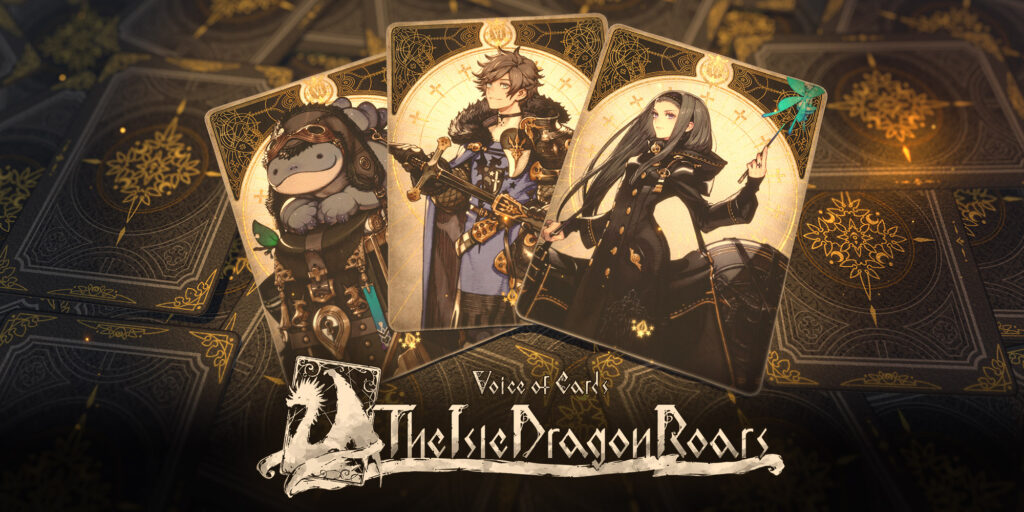
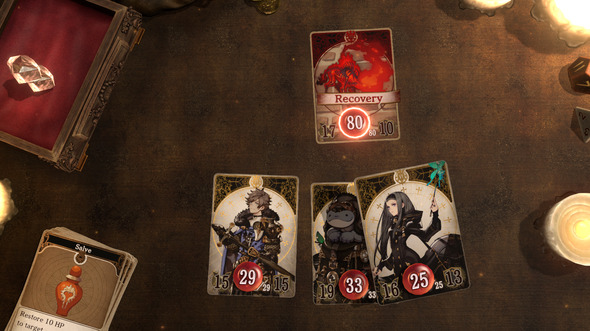
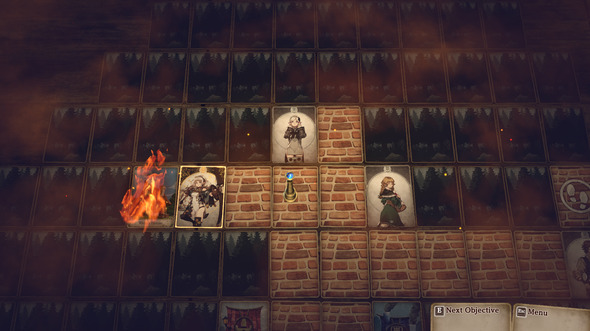
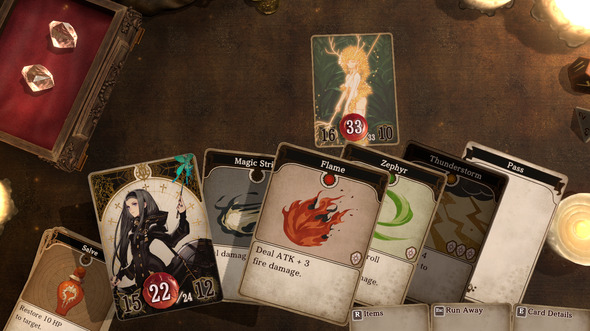
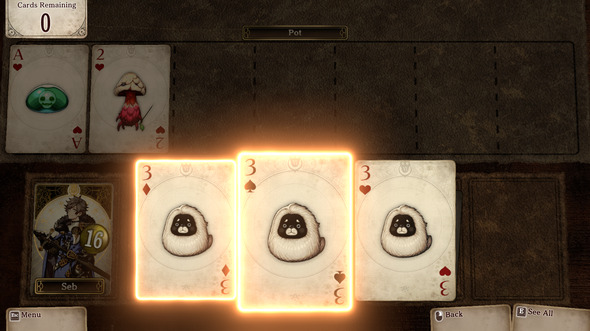




[…] Voice of Cards: The Forsaken Maiden, the latest installment in the unique card-based RPG franchise Voice of Cards. This second release in the Voice of Cards series sends players on an adventure in an atmospheric […]
[…] has only been four months since Yoko Taro delighted us with Voice of Cards: The Isle Dragon Roars, and we’re already invited back to the Voice of Cards universe with the second game in the […]
[…] with fantasy elements and role-playing gameplay. Two titles have already come out in this series: The Isle Dragon Roars and The Forsaken Maiden, both of which we reviewed and were well-received. Now the developers are […]
[…] hasn’t even been a full year since the first Voice of Cards game, The Isle Dragon Roars, debuted, but we’re already looking at the third entry in Yoko Taro’s […]